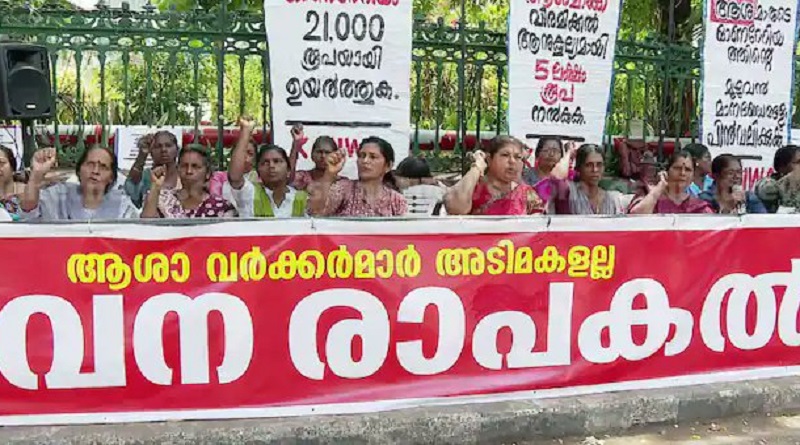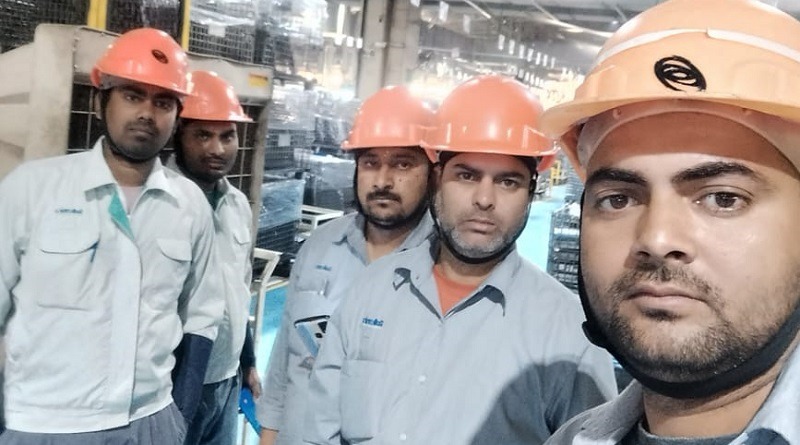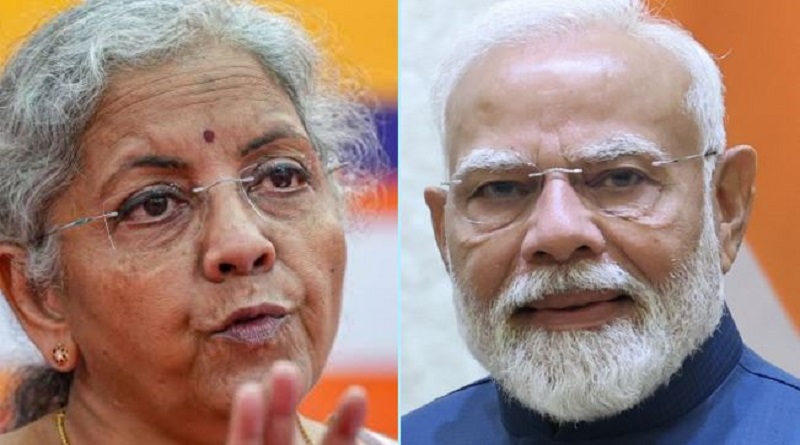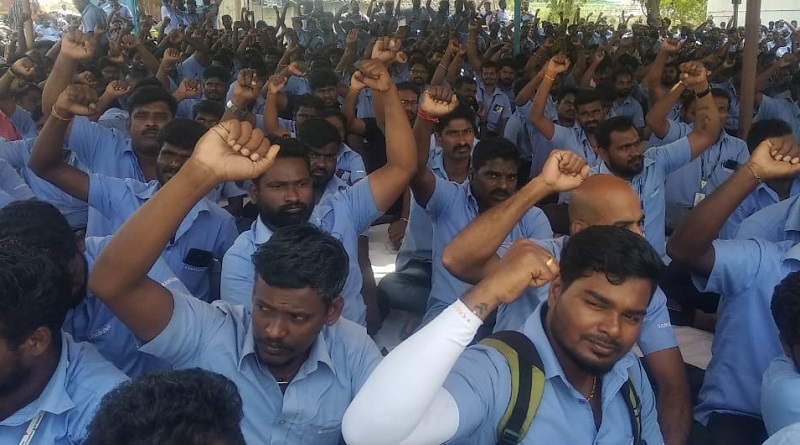Report: Delhi Convention on the rights of Tea Workers of Darjeeling-Terai-Dooars and Assam
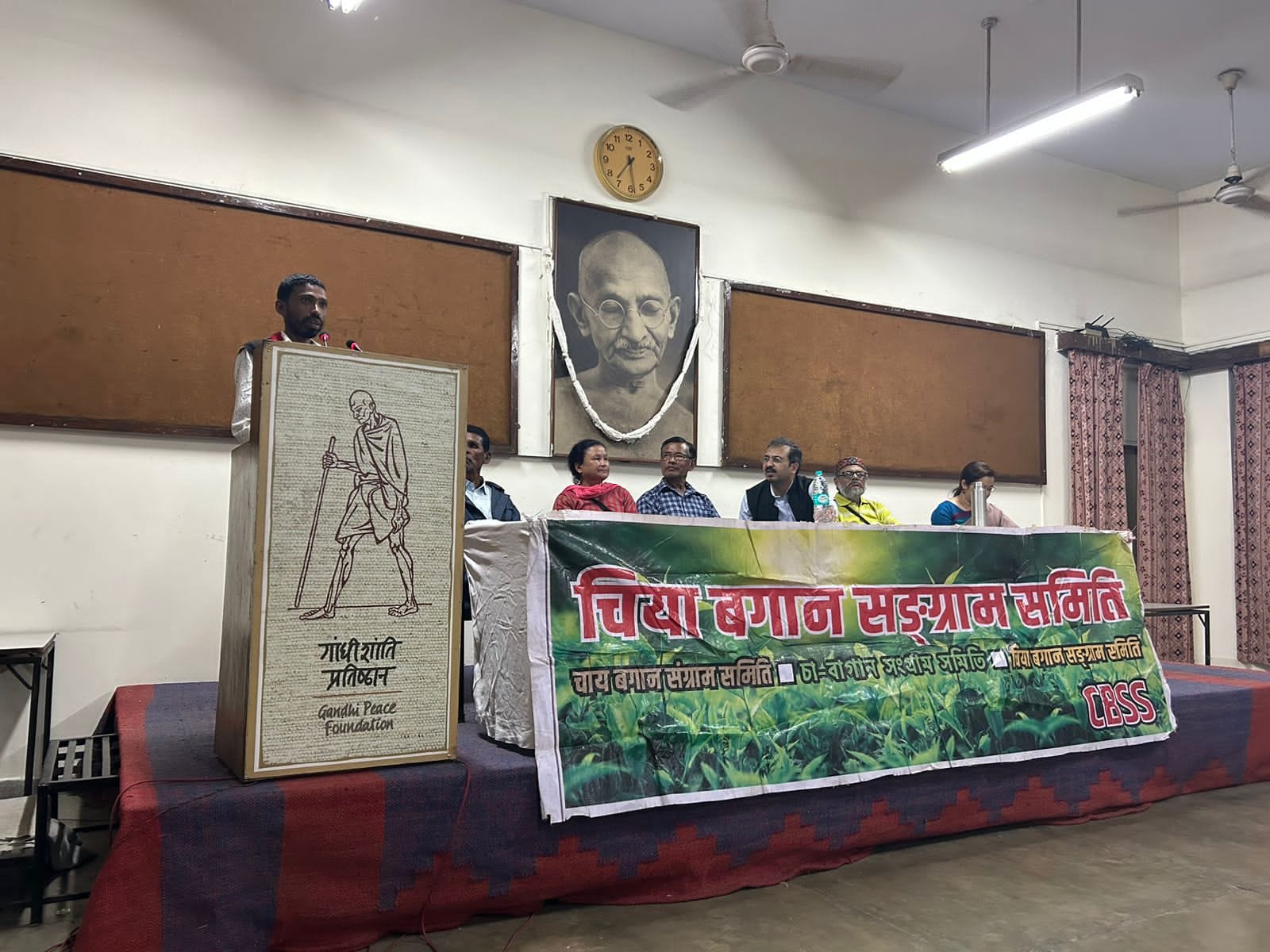
by: Sumendra Tamang
The 14th November Delhi Convention on the rights of the tea workers of Darjeeling hills-Terai Dooars and Assam, focusing on the issues of minimum wage and land rights, took place in Gandhi Peace Foundation, ITO, New Delhi. This convention, organized by two organizations- Chaay Bagan Sangram Samity (CBSS) from Darjeeling-terai-dooars and Chah Shramik Mukti Sangram Samity (CMSS), Assam witnessed speakers from different worker organisations across India, diversifying and encompassing the issues the working class faces in the different states of India.
Sumendra Tamang, member of the CBSS, anchored the convention, where workers from Darjeeling and Assam, along with other dignitaries from Delhi were present in the dais. Sumendra highlighted the success of the 13th November Massive Workers Rally and yet, reiterating the need for more such mobilisations demanding the repeal of the newly passed Labour Codes by the central government.
The first speaker of the convention was Ashish Tamang, tea garden workmen and Secretary of the Joint Action Committee (JAC) in the closed Toongsong Division of Dooteriah Tea Garden, Darjeeling. He started by highlighting the strong nexus between the political rulers and the tea garden owners and how this nexus has been hampering the production relation of the tea gardens in the hills. Further, he also mentioned how this nexus has been helping both the political rulers and the tea garden owners simultaneously at the cost of the poor and pathetic conditions of the tea garden workers.
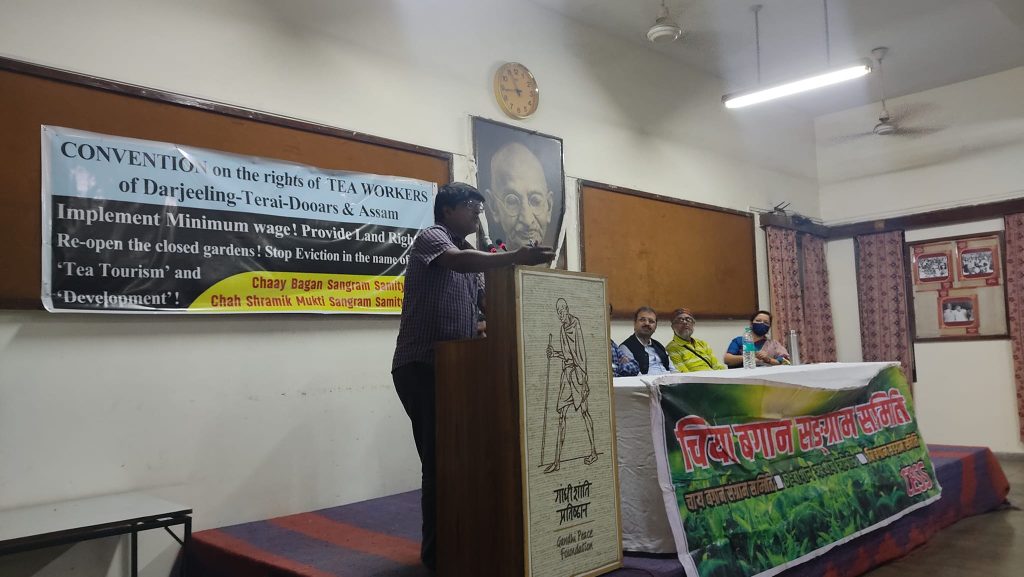
Likewise, he also stressed on how the new Labour Codes could worsen the plight of the tea garden workers and which in future, could lead to a further migration of labourers from the gardens to metropolitan cities; thereby, highlighting the importance of the implementation of minimum wages and the necessity of land rights for the tea workers, make the closed tea gardens functioning in a proper way.
Nevertheless, he also did speak of the importance of the mobilisation of tea garden workers organizationally in the future and reminded everyone of the creative initiative of workers managing the Toongsong TG through the JAC. Finally, the speaker made an appeal to all those present in the convention to develop a sense of solidarity for the demands of minimum wage and land rights so that those in the corridors of Delhi realize the urgency of these issues.
Do Read-
- Puducherry in resistance against electricity Privatisation: A ground report
- Puducherry electricity department is in profit why want to privatize? Exclusive Interview
The second speaker, Murali Taati, President of CMSS, and retired tea worker, who hails from Assam, started by highlighting how during the period when there was a buzz and a huge concern regarding the working conditions of the workers who produce tea and how this concern slowly started to fade away with India pursuing neo-liberal policies since 1990’s, He made a point to remind how the government both at the centre and the state started to withdraw from its responsibilities in the tea sector, while at the same time giving space to corporates in the management of these tea gardens resulting in the poor conditions of the workers and leading them to alienation from their work. Likewise, he raised an important question- Why are the workers in the tea gardens not guaranteed minimum wages despite these tea gardens earning guaranteed profits?
Basanti Tamang was the third speaker who is a worker in the Margaret’s Hope TG. She, through her speech in Nepali, specifically highlighted the exploitation the workers in the tea gardens face everyday from the managers as well as the owners and yet do not have any guaranteed rights. Also, how her own fellow workers are not conscious of their exploitation and even if they are, they do not have the courage to come forward to raise their issues and this was why she had decided to keep on raising these issues and was even committed to do so in the future.
Similarly, the fourth speaker was Subay Tamang who hails from Peshok Tea Garden (TG).
Though retired now, he shared his experiences highlighting the bitter compromises the trade unions in the hills always had to make during any tripartite meetings under the guise of the corruptive government; for example, during his time as a worker in the Peshok TG, he had attended such a meeting in Siliguri and how an agreement was reached to the decision stating if the then company did not receive the lease documents of the Peshok TG, the pending PF (provident fund) dues would not be distributed to those tea garden workers.
He ended his speech by asking two questions- Why are there laws that are always against the interests of the workers? How can the green tea leaves collected if the workers stop working in the gardens?
The fifth speaker Mubarak Ali from Assam highlighted the importance of language barriers the workers in the tea gardens has to face aside from the issues of minimum wage and land rights. He mentioned about the new Education Policy in Assam that stated that important subjects like Mathematics and Science would be taught in English, putting an extra burden on the children of these workers in the tea gardens. Further, he also mentioned about the transfer of land rights of any contractual worker to the big companies like NRM by the Assam government.
Accordingly, he reminded those present in the convention about the brutal firing incident against the tea garden workers who had gone to meet the owners in 2017 regarding pending dues of the workers from Bogidhola tea garden where 17 workers were injured. In this context, he stated how the government from owning 15 gardens have undergone a massive process of privatisation of 12 gardens signifying the government support to rich corporates with the objective to disrupt any efforts of unionisation of the tea garden workers. He also stressed upon the mismanagement and rampant absence of labour laws amongst different small tea gardens and bought leaf factories.
Dr. Deepak Mishra, professor from JNU, started by asking a question- How could it be possible that a degradation of work was allowed in these tea gardens. The common narrative in the academia and business circles regarding the crisis in tea gardens revolve around the high labour cost that increased the cost of production of tea and this to him has to be deconstructed. According to him, the focus had to be shifted to owners and how much they were investing regarding the welfare of the workers and how much reinvestment went back to those gardens to raise their productivity.
He further stated that the consumption of tea had never been a problem since the international, national and local demand for tea had always been high. But the government perspective – lowering the value of labour and raising the value of the product- has been a fundamental feature of crony capitalism.
Professor Mishra suggested that besides wages, housing, education and other rights were as much important and thus, it was must to find who is providing which rights to the workers. Moreover, as he rightly said, degradation of work leads to degradation of workers. Lastly, for him, identity-based discrimination outside the garden was also necessary to understand the vicious cycle of cheap labour.
Dr. Rinju Rasaily, who teaches in Ambedkar University Delhi, was the seventh speaker. She particularly focused on her work “Tea Gardens in India, particularly in the hills in the failure of citizenship”. For her, until and unless, the tempo of the identity movement did not go up, the issues of land rights could become very difficult and complicated, thereby, highlighting the importance of the notion of organised tea unions. Likewise, both the state as well as the plantations become agents that needed to be accounted for. She stressed on the importance of a new imagination circling around the notion of ‘collective bargaining’.
Most importantly, she talked about how the withdrawal of responsibilities by the state, the planters as well as the owners of the tea gardens, has been leading to a ‘stateless’ situation among the tea garden workers. She also mentioned how the government through the Tea Boards of India is on the verge of creating an ethnic conflict amongst the Nepalese in Nepal as well as India. Thus, she made an attempt to draw a linkage between the question of livelihood linked with ethnicity.
Furthermore, she also highlighted the mental reimbursement amongst the tea garden workers particularly the retired ones and how this was affecting the migration of the so-called productive labour. Since, migration here is high risk migration, it is expected of the government, particularly the state to intervene but in reality, the state is not bothered about it. Therefore, she concluded by reminding the necessity to avoid the fragmented trade union movements and seek for the best practices of cooperative management in the necessary states.
Anshuman Sharma (Assam) was the next speaker whereby he stressed upon the importance to understand the tea industry in totality. He starts by highlighting how the big corporates despite not owning the vast portions of tea gardens, control the ‘auction’ process in entirety.
He also touched upon the small tea growers where a big part of tea is grown by small tea growers on a larger scale. Then, he talked about those ‘ex tea garden workers’ who are from ‘outside’ but are practising subsistence agriculture but do not have ownership of the land. Thereafter, there was another section of workers who despite the ownership of some portions of tea gardens still worked in other gardens. Likewise, amongst these various types of workers, it may seem like the small tea growers are in good position but they too are not exactly a big player because they depend on those prices determined at the auction market controlled by the big corporates.
Arya, a political activist from Kerala spoke about her experience in Munnar tea workers’ movement and it’s importance in the contemporary tea garden struggle. Satish, also a political activist from Tamil Nadu shared his experience about land rights, migration and citizenship crisis, and flawed government policies in the tea gardens of Tamil Nadu, and Likewise Dithi Bhattacharya also stressed upon the effects of new labour codes among the tea garden workers and how this new labour codes could result into magnified and extensive anti workers atmosphere. Binita Rai, a member of Gorkha Students, JNU extended her solidarity with the tea garden workers of Darjeeling in particular and global workers movement in general and also stressed upon the importance of self determination issue of Indian Gorkhas.
Mukul, senior trade unionist from Mazdoor Sahayog Kendra, and a representative of Mazdur Adhikar Sangharsha Abhiyan (MASA) spoke of the importance of pan Indian working class movement against the growing capital diktat, and how the new labour codes have changed the definitions of things like minimum wage, and will severely affect the workers, and the new labour codes were supported and passed in the favour of burgeoisie by the Indian state machinery.
Samik, a political activist and a member of CBSS concluded the convention by pointing out how the protest suicides, euthanasia appeals and starvation deaths from the tea gardens remained unnoticed, revealing the marginalisation of the producers of tea, with which people start their day with. The improper way of running of garden, siphoning of funds to other industries, lack of old bush uprooting-infilling-replantation works are the causes of degradation of the gardens.
He also stressed about the rampant snatching away of retirement benefits, the ex-garden sell and auction data manipulation by owners to conceal the real profit statistics, and also the governmental indifference, resulting in a doldrum in the plantation belt. Stressing upon the importance of working class consciousness, and broader solidarity in the decisive struggle against capitalism, he added a few words upon the evolution of CBSS. He also focused on the crucial issue that albeit demands like Gorkhaland is important, but citing it as the precondition for achieving Land rights and Minimum wage of the workers is superficial and a decisive working class unity and solidarity had to develop. This is what we can strive for from this convention, he said, and proposed we would put a deputation to the President of India, about the issues that came up in this Delhi Convention.
Representatives from organisation like NDLF and SWC from Tamil Nadu, IMK from Delhi, SWCC from West Bengal, and several other concerned citizens, activists, and students-youths were present in the convention extending their solidarity with the tea garden movement in particular and working class movement throughout India in general.
The convention thus did go smoothly since everyone on the dais had to say so much but because of limited time, the organizers had to rush each speaker. Nevertheless, the huge output that this convention resulted in was itself one of its outcome. The varied experiences and knowledge of different speakers irrespective of who they were, did meet at one point in common- that is all of them were indeed concerned about the possible implications of the new labour codes on the welfare of the workers and the need for more frequent massive mobilization of workers on a pan India scale.
Much more than this is the need for more frequent interactions amongst labour organizations and labour unions across India. This convention thus, did help the workers present in the convention to gain more confidence in terms of understanding mass mobilizations on a large scale if pursued regularly, could seriously change the dynamics of working class movement and consciousness across the whole country.
Subscribe to support Workers Unity – Click Here
(Workers Unity follows the principles of independent fair media. You can strengthen it by following its Facebook, Twitter and YouTube. Click here to subscribe to Workers Unity’s Telegram channel. Download the app for easy and direct reading on mobile.)
